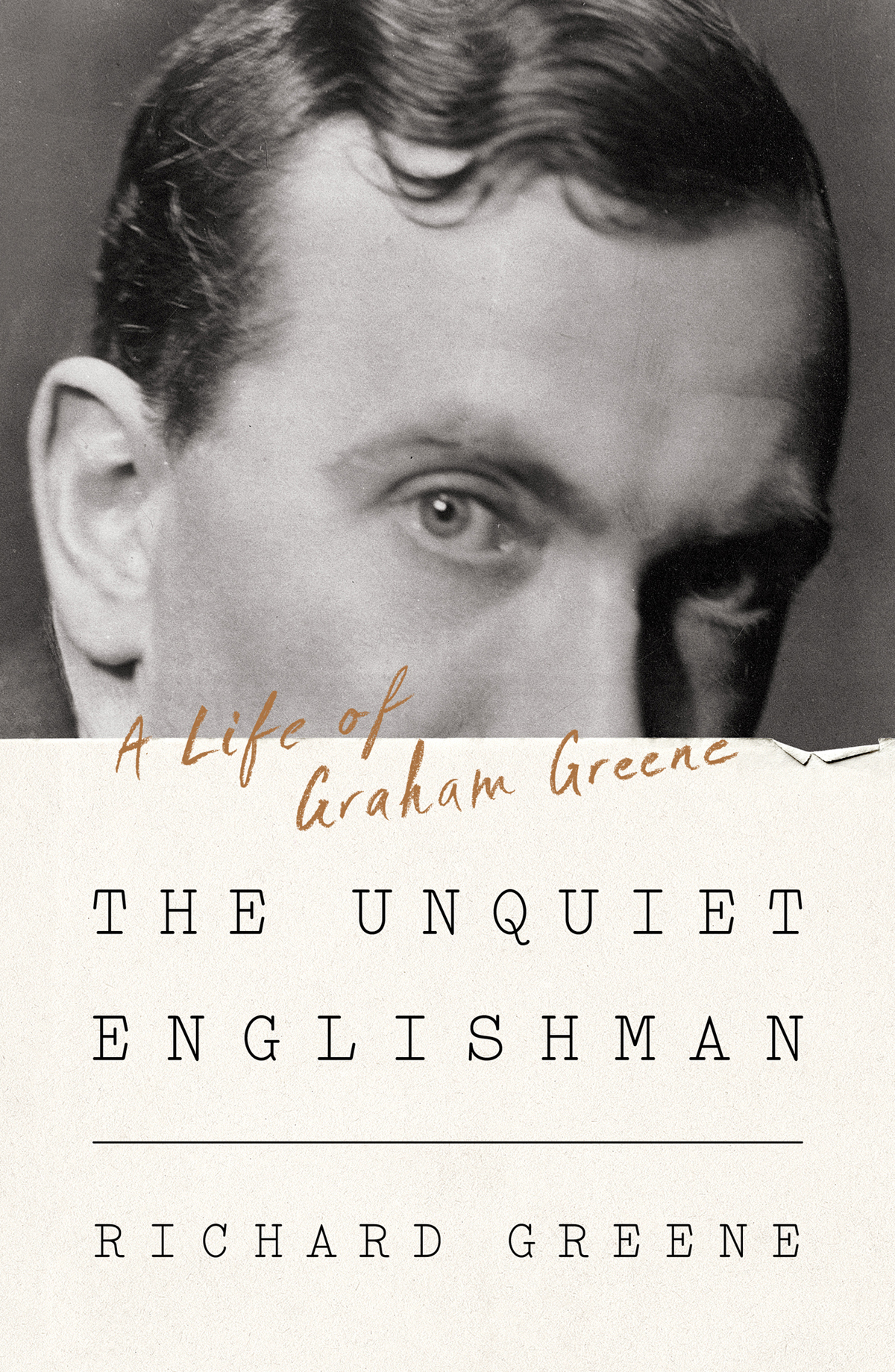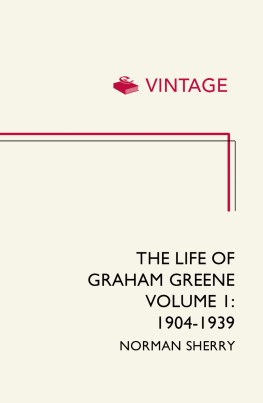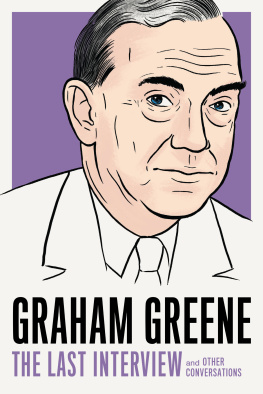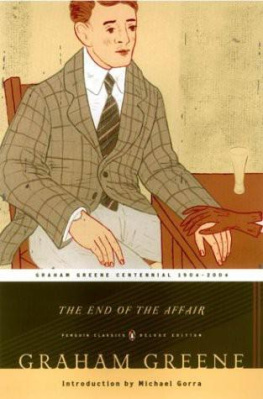Richard Greene - The Unquiet Englishman: A Life of Graham Greene
Here you can read online Richard Greene - The Unquiet Englishman: A Life of Graham Greene full text of the book (entire story) in english for free. Download pdf and epub, get meaning, cover and reviews about this ebook. year: 2020, publisher: W. W. Norton & Company, genre: Non-fiction. Description of the work, (preface) as well as reviews are available. Best literature library LitArk.com created for fans of good reading and offers a wide selection of genres:
Romance novel
Science fiction
Adventure
Detective
Science
History
Home and family
Prose
Art
Politics
Computer
Non-fiction
Religion
Business
Children
Humor
Choose a favorite category and find really read worthwhile books. Enjoy immersion in the world of imagination, feel the emotions of the characters or learn something new for yourself, make an fascinating discovery.

- Book:The Unquiet Englishman: A Life of Graham Greene
- Author:
- Publisher:W. W. Norton & Company
- Genre:
- Year:2020
- Rating:5 / 5
- Favourites:Add to favourites
- Your mark:
- 100
- 1
- 2
- 3
- 4
- 5
The Unquiet Englishman: A Life of Graham Greene: summary, description and annotation
We offer to read an annotation, description, summary or preface (depends on what the author of the book "The Unquiet Englishman: A Life of Graham Greene" wrote himself). If you haven't found the necessary information about the book — write in the comments, we will try to find it.
The Unquiet Englishman: A Life of Graham Greene — read online for free the complete book (whole text) full work
Below is the text of the book, divided by pages. System saving the place of the last page read, allows you to conveniently read the book "The Unquiet Englishman: A Life of Graham Greene" online for free, without having to search again every time where you left off. Put a bookmark, and you can go to the page where you finished reading at any time.
Font size:
Interval:
Bookmark:

THE
UNQUIET
ENGLISHMAN
A Life of Graham Greene
RICHARD GREENE

In Memory of Bernard Diederich
19262020
I t was mid-December 1951, and French colonial forces were fighting the nationalist Viet Minh for control of Vietnam. In the years that followed the French withdrew and American forces would come in ever greater numbers to pursue their own futile war. Phat Diem was a strategic enclave on the Gulf of Tonkin about 75 miles south of Hanoi, and it was now surrounded by Viet Minh guerrillas firing from a range of 600 yards. Wading ashore from a landing craft that also transported a French commando unit, the forty-seven-year-old Graham Greene, a tall man and perhaps an easy target, could see buildings that had been blasted by bazookas and a market in flames.
It reminded him of the Blitz, but with many more corpses, some sticking up out of a canal.
Catholics and Buddhists from the town sheltered in and around the cathedral, bringing with them whatever they treasured photographs, pots, pans, pieces of furniture. A friend of Greenes from an earlier visit, a Belgian priest named Willichs, had perched in the bell tower and was reading his breviary. With mortars firing and planes dropping bombs and supplies, a distressed Greene, thinking that this day he might die, asked to have his confession heard. Around 1980, he spoke of this as the last time he had received the sacrament, but soon after renewed the practice. On this memorable occasion in Phat Diem, he was given as a penance one Our Father and one Hail Mary, and the priest handed him a Tintin book so that he would have something to read.
Greene learned that the attack had begun with an advance party slipping into a procession in honour of Our Lady of Fatima. There was then a surprise attack on the officers quarters, although it turned out that only one of the dead was an officer twenty-five enlisted men were killed.
No other journalist had got near this shambles, and the French were anxious to keep it a secret. Greene got the impression that they regarded the Belgian priest as a spy he belonged to the Socit des Auxiliaires des Missions, which existed specifically to aid the transition from colonial to national churches in Asia, an objective that hardly endeared them to the French in Vietnam.
Getting rid of Graham Greene was never going to be an easy proposition. Vietnam is perhaps the best known of his political and literary involvements. He made four winter visits to Vietnam, and in 1955 the fight for Phat Diem provided a pivotal scene in his novel The Quiet American, which provoked outrage in the United States by revealing how deeply the country was involved in the bloodshed, in the belief that a distant colonial conflict was a front line in the Cold War. This brave and prescient novel foresaw the American war in Vietnam, the horrors of which continued until 1975.
Half a century later, the novel still causes awkward moments along the Potomac. In 2007, former president George W. Bush, a man sometimes thought a prisoner of his own innocence, gave a speech to the Veterans of Foreign Wars, which included an odd remark, indicating that the novels criticism of American foreign policy retained its sting in the time of the Iraq War: In 1955, long before the United States had entered the war, Graham Greene wrote a novel called The Quiet American. It was set in Saigon, and the main character was a young government agent named Alden Pyle. He was a symbol of American purpose and patriotism and dangerous naivete. Another character describes Alden this way: I never knew a man who had better motives for all the trouble he caused.
Graham Greene continues to speak to an unquiet world. This biography will unravel the public and private lives of this most admired novelist. Shirley Hazzard spoke of him as one of the writers of the century, and John le Carr believes that in his time Graham Greene carried the torch of English literature, almost alone.
This book takes a very high view of Graham Greenes accomplishments, and so endorses the common opinion of three generations of writers and critics that he is one of the most important figures in modern literature. In course of time, our sense of even a great authors work will contract to a few defining books. That is how canons are formed. And yet, the process is wasteful. It is easy enough to boil Graham Greenes accomplishment down to, say, five essential books of his middle years: Brighton Rock (1938), The Power and the Glory (1940), The Heart of the Matter (1948), The End of the Affair (1951), and The Quiet American (1955). Once we do this, however, other first-rate novels, especially those written after 1960, not to mention his plays, short stories, journalism, essays, letters, memoirs, film scripts, and travel books, are shunted off into lists of Further Reading. In fact, Graham Greene is one of the very few modern writers in English who can be valued for a whole body of work. As a craftsman, he was a perfectionist rarely content with something he had written, and so we can sometimes be misled by his criticisms of his own books. Like any writer, he could occasionally be uneven; still he maintained an extraordinarily high technical standard in his writing, and many of his insights into human character and motivation, politics, war, human rights, sexual relationships, and religious belief and doubt remain compelling and provocative. It is hard to think of a recent writer in English who comes as close to greatness as he does.
There is already a three-volume authorized biography of Graham Greene by Norman Sherry (19892004) and a more prosecutorial work by Michael Shelden (1994), as well as several fragmentary or partial works. Both completed biographies occasioned controversy when published, not least because they focused to a remarkable degree on the minutiae of his sexual life, provoking some reviewers to regard parts of the works as prurient and trivial. Broadly speaking, the complaint against these works was that in the midst of all the lurid details they had lost sight of what mattered in the life of Graham Greene.
And yet the strengths and flaws of existing biographies may be almost moot, as the body of evidence has grown enormously since those works appeared; the landscape of his life has a different outline. In recent years, many thousands of pages of new letters and documents have become available, among them letters to his family, friends, publishers, agents, and close associates. In one instance, lost letters to his immediate family were discovered in a hollow book. His daughter, Caroline Bourget, has made available her collection of private letters from her father and participated in extended interviews, allowing a rich new perspective on his family life. The many letters Greene wrote to Father Leopoldo Durn, his confessor and companion on journeys through Spain and Portugal that gave rise to his entertaining and meditative novel Monsignor Quixote, have now been deposited in an archive, as have his letters, amounting to over a thousand pages, to his French agent Marie Biche, and a comparable collection of letters to the publisher Max Reinhardt developments that allow for a much deeper knowledge of two of his most valued friendships, but also of the very complicated way he earned his living. A memoir by his wartime colleague at MI6 Tim Milne forces a careful reconsideration of the novelists relationship with the double agent and defector Kim Philby.
Font size:
Interval:
Bookmark:
Similar books «The Unquiet Englishman: A Life of Graham Greene»
Look at similar books to The Unquiet Englishman: A Life of Graham Greene. We have selected literature similar in name and meaning in the hope of providing readers with more options to find new, interesting, not yet read works.
Discussion, reviews of the book The Unquiet Englishman: A Life of Graham Greene and just readers' own opinions. Leave your comments, write what you think about the work, its meaning or the main characters. Specify what exactly you liked and what you didn't like, and why you think so.








